Edition: 15 to 26 January 2024
-scientific-seminar.jpg?sfvrsn=24077bf2_1) ©DLD Thailand | ASIA AND THE PACIFIC Regional Field Epidemiology Training Program for Veterinarians (R-FETPV) scientific seminar Future veterinary epidemiologists presented findings on outbreak investigation and surveillance, addressing priority animal and zoonotic diseases at the R-FETPV scientific seminar in Bangkok from 22 to 24 January 2024, supported by Defense Threat Reduction Agency (DTRA) and USAID. A total of 15 trainees from four countries showcased diverse topics, including avian influenza, African swine fever and rabies. Mentors from the Department of Livestock Development (DLD) Thailand, FAO and Thai universities actively participated, offering valuable feedback for the trainees. This event, integral to the R-FETPV training curriculum, emphasized practical fieldwork and the application of epidemiology. |
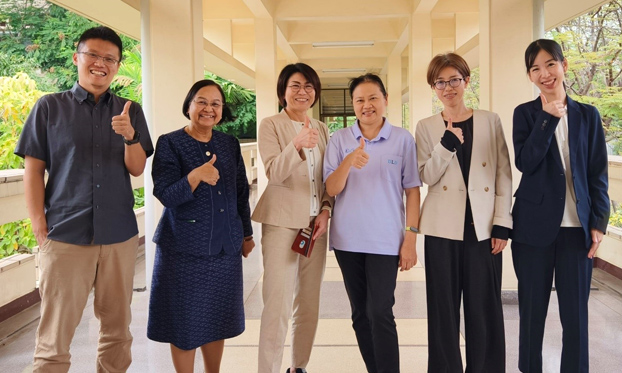 ©FAO/Hao tang | ASIA AND THE PACIFIC
One Health epidemiology: R-FETPV hosting Japan FETP delegation for experiences exchange in epidemiology capacity building
From 24 to 26 January 2024, FAO and the R-FETPV team hosted a delegation from Japan FETP. The meeting focused on exchanging experience in veterinary epidemiology capacity building. R-FETPV shared its 14-year journey in veterinary epidemiology, highlighting positive impacts of its regional approach on strengthening the workforce and enhancing systems for delivering high-quality animal health services. Japan FETP, affiliated with the National Institute of Infectious Diseases, presented its training programme and initiatives for engaging veterinarians in public health efforts. The discussions touched upon shared challenges in training management and the establishment of effective networks for sustained impact. |
Learn more about our work on epidemiology here.
| |
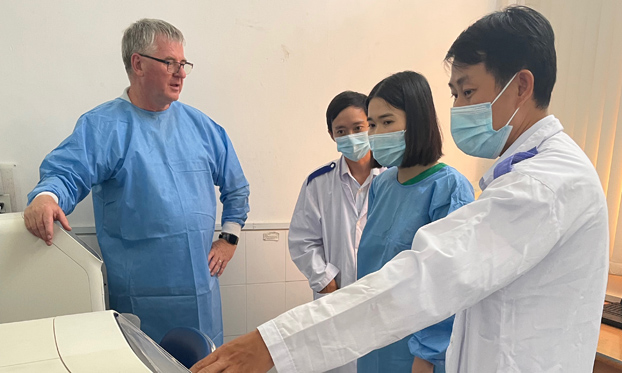 ©FAO/PAWIN PADUNGTOD | VIET NAM AND ASIA AND THE PACIFIC Laboratory assessment in Viet Nam FAO and the Australian Centre for Disease Preparedness (ADCP) organized a laboratory mission to Viet Nam from 7 to 20 January 2024. The team, including Chris Morrissy, FAO RAP Laboratory Expert, Caitlin Holley, ACDP International Programme Coordinator and Kristen McAuley, ACDP Proficiency Testing Programme Coordinator, reassessed Department of Animal Health (DAH) laboratories in the South using the FAO Laboratory Mapping Tool. The mission provided backstopping support on quality assurance, quality management and developed a roadmap for ISO 17043 accreditation, specifically for proficiency testing of avian influenza at the National Centre for Veterinary Diagnostics. This followed the first mission in November 2023 to laboratories in the North. The final briefing meeting, chaired by the Director-General of DAH, Nguyen Van Long, took place in Ho Chi Minh City on 19 January 2024, with participation from other development partners including USAID, DTRA and DFAT. |
| Learn more about our work on capacity development of laboratory here. | |
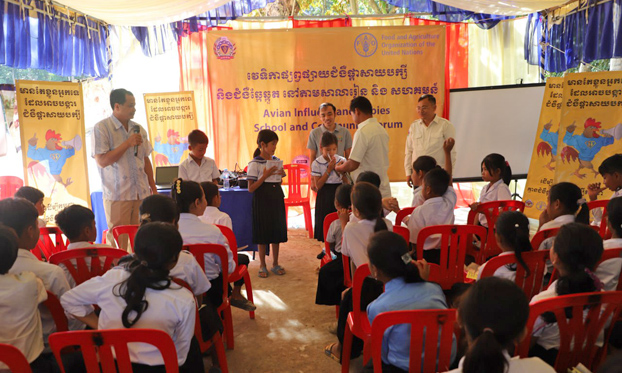 ©FAO/Siheng Ngon | CAMBODIA Avian influenza and rabies school and community forum
The Ministry of Agriculture, Forestry and Fisheries’ General Directorate of Animal Health and Production (GDAHP), in collaboration with the Cambodia Communicable Disease Control Department (CCDC) of the Ministry of Health and FAO, organized the avian influenza and rabies school and community forum in Svay Rieng, Prey Veng and Battambang provinces. Funded by the US Agency for International Development (USAID), the forum brought together 4 857 students and community members, providing education and tools for preventing avian influenza and rabies, and enabling them to share lessons learned with friends and families. The initiative is set to expand to Kampong Thom, Kampot, Siem Reap and Takeo provinces for broader impact. |
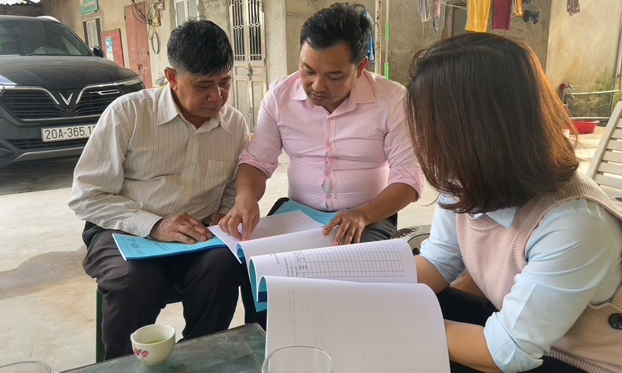 ©FAO/Pawin Padungtod | VIET NAM Initial results of biosecurity model farms
Through USAID support, eight pig farms in Ha Nam and Thai Nguyen were selected as biosecurity model farms. Action plans were developed to improve biosecurity, minimize disease risks, reduce antibiotic use and improve production efficiency. In late January 2024, the project team, including FAO, the National Center for Agricultural Extension (NCAE) and provincial extension staff, monitored the implementation of model farm action plans. Between 15 and 28 January 2024, FAO model farm developers and NCAE staff visited these farms, noting improvements such as enhanced pig houses, upgraded water systems, new footbaths at the entrance to the farm and pig houses, and changed practices for better biosecurity. Initial results observed by the model farmers indicated a 10 percent increase in overall production, up to 40 percent reduction in antibiotic usage, decreased working time, and an improved farm environment with reduced odor. |
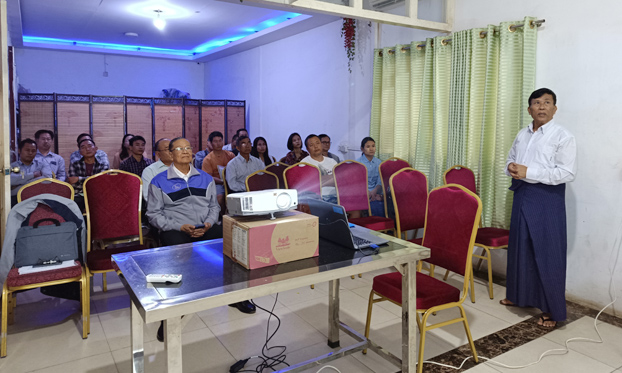 ©FAO/Ohn Kyaw | MYANMAR Workshop on biosecurity, good animal husbandry practices and AMR In collaboration with Myanmar Livestock Federation, FAO conducted a workshop on 25 January 2024 in Hmawbi Township, Yangon region, funded by USAID. The workshop focused on improving biosecurity and good animal husbandry practices among farmers, feed sellers and egg collectors. The objective was to reduce avian disease risk, including zoonotic influenza, and to raise awareness of the One Health approach and AMR. |
Learn more about our work on risk reduction along the value chain here.
| |
-visits-fao-rap.jpg?sfvrsn=46bfd6ce_1) ©FAO/JIM CARO | ASIA AND THE PACIFIC President of the Federation of Asian Veterinary Association (FAVA) visits FAO RAP The President of FAVA, Isao Kurauchi, visited FAO RAP last 26 January 2024, accompanied by Achariya Sailasuta, Director of FAVA Office in Bangkok, and other FAVA delegates, warmly welcomed by FAO ECTAD RAP Regional Manager Kachen Wongsathapornchai and the AMR team. Discussions centered on the productive collaboration between FAO RAP and FAVA since 2020, emphasizing the engagement and empowerment of veterinarians in Asia in the global efforts to mitigate AMR.
|
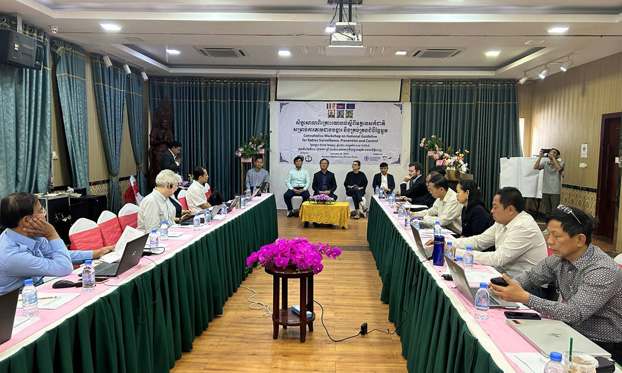 ©FAO/But Bunnakara | CAMBODIA Workshop on a new draft of the national guidelines for rabies surveillance, prevention and control
The Ministry of Health’s Communicable Disease Control Department (CDC) and GDAHP, in collaboration with FAO and the World Organisation for Animal Health (WOAH), with the support of the Deutsche Gesellschaft für Internationale Zusammenarbeit (GIZ), co-organized a consultative workshop on 30 January 2024, in Phnom Penh. The workshop sought to discuss the new draft of the Cambodia National Guidelines for Rabies Surveillance, Prevention and Control. Participants reviewed the draft national strategy and a proposed outline of the content, focusing on reaching a consensus on the guidelines’ structure and content for clear objectives. |
| Learn more about our work on One Health here. | |
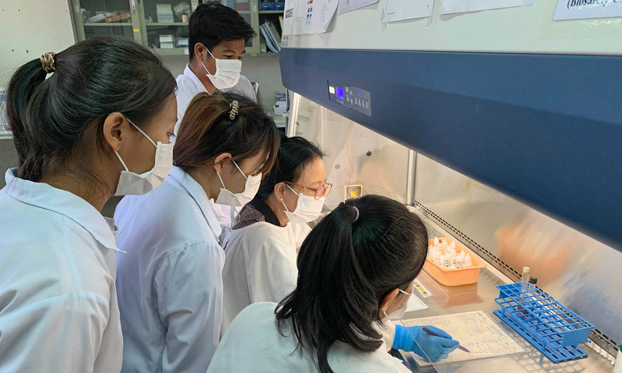 ©fao | ASIA AND THE PACIFIC AND THE PHILIPPINES AMR team holds post-workshop consultation with the Philippines
The FAO ECTAD RAP AMR team, following the AMR data management workshop held in November 2023, organized a series of post-workshop consultations. The first session, led by FAO Philippines on 23 January 2024, engaged participants from the National Meat Inspection Services, Bureau of Animal Industry, Bureau of Fisheries and Aquatic Resources, Philippine Carabao Center and the National Dairy Authority. Focused on detailed discussions, the session addressed the current status of AMR data management, analysis and reporting, particularly concerning the monitoring and surveillance of bacteria in healthy animals intended for consumption. Thanks to USAID for the funding support.
|
Learn more about our work on AMR here.
| |
